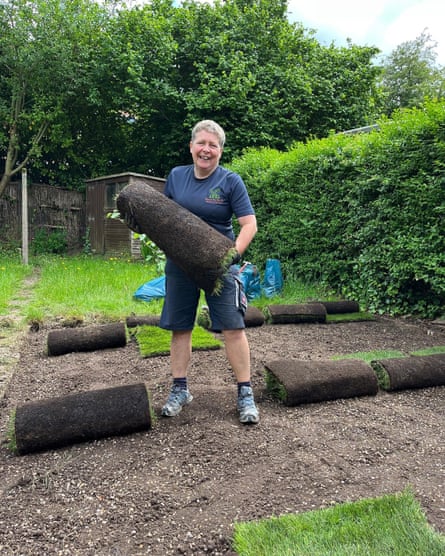Record numbers of people aged 50 and over in the UK have become economically inactive since the start of the pandemic, the Office for National Statistics said this spring, with the majority (77%) of adults aged 50 to 59 saying they left their previous job sooner than expected.
Guardian readers who responded to a callout described their reasons for leaving the workforce in their 50s – some permanently, some for the time being – with many saying the pandemic had played a role in their decision.
Many cited disillusionment with management or the nature of their work, increasing stress and feeling undervalued, with some saying living more meaningfully or simply was more important than lucrative work.
For a number of respondents, caring for family members was a factor, and while most do not envisage having to return to the job market, various people said they may have to do so because of spiralling costs in Britain.
‘I’m trading my three-bed terrace for health and personal freedom’
 Steve Walker, 51, says teaching was his identity – until he quit to live a happier life. Photograph: Steve Walker/Guardian Community
Steve Walker, 51, says teaching was his identity – until he quit to live a happier life. Photograph: Steve Walker/Guardian Community
Steve Walker, from Rochdale, who turns 52 next week, says he felt well respected and fulfilled in his job as head of the humanities and history departments in a secondary school. “Teaching was always what I wanted to do, but around the time I turned 50 I just decided that all my career goals and ambitions had been hit,” he says.
When the pandemic shifted the focus of his job to “box ticking and accountability”, he began feeling overwhelmed. “Suddenly I was just struck by how my life was controlled every second by the tyranny of bells, timetables, examinations, terms and deadlines. I felt fatigued, anxious and depressed.”
After being diagnosed with long Covid in March and three months’ sick leave, Walker took the decision to resign for good.
“This profession was who I was, for nearly 30 years. I was surprised at how little the decision impacted me, apart from a feeling of guilt at leaving my colleagues and students mid-year,” he says. “Now, I look forward to having more control over my life. I won’t be going back.”
Walker says money is “obviously” a concern, but he and his wife hope they can manage by embracing a simpler lifestyle and reducing their “economic footprint”.
“We are in the process of selling our oversized three-bed ambition house, paying off all our debts and settling in a small cottage in Argyll, Scotland. I have secured a volunteer guide role at the local museum and plan to rediscover all my ignored hobbies,” he says.”
“I have told my wife that I’ll go and stack shelves in a supermarket if we’re short of cash one day. I think I did make a difference. But now it’s time to make a difference to my life.”
‘At some point I’ll have to earn money again’
 View image in fullscreenKirsty MacCulloch, 52, says she never thought she would shelve her career until she did. Photograph: Kirsty MacCulloch/Guardian Community
View image in fullscreenKirsty MacCulloch, 52, says she never thought she would shelve her career until she did. Photograph: Kirsty MacCulloch/Guardian Community
Kirsty MacCulloch, from Surrey, decided to stop looking for new employment after she was made redundant from her management job in international recruitment in 2020.
“Now, I’m funemployed [sic] and taking some time to work out what I want to do when I grow up,” the 52-year-old says. “I’m re-reading all my books, I’m volunteering with a community kitchen and a charity, I’m sorting my garden out, practising recipes, catching up on streaming and spending time with family and friends.”
Financially she is lucky, she says, having saved up a lot by not going on holiday for 10 years as she often travelled for work.
“The only thing that will make me return to employment is the increase in the cost of living. I’m not able to draw a pension yet and the annual budget I had planned to carry me through has been blown away by price rises, so won’t be enough to get me to pensionable age,” she says.
“But I’ve realised work isn’t the be and end all, that there are other ways to get rewarded – although five years ago, I’d never thought I’d do this.”
skip past newsletter promotion
Sign up to First Edition
Free daily newsletter
Our morning email breaks down the key stories of the day, telling you what’s happening and why it matters
Enter your email address Enter your email address Sign upPrivacy Notice: Newsletters may contain info about charities, online ads, and content funded by outside parties. For more information see our Privacy Policy. We use Google reCaptcha to protect our website and the Google Privacy Policy and Terms of Service apply.
after newsletter promotion
‘There were no flexible jobs I wasn’t overqualified for’
For Deborah, 55, from Gloucestershire, it was primarily the pressure of juggling childcare, housework and her career that made her leave her part-time job as a copywriter during the pandemic.
“I suddenly had no support system any more. My now 12-year-old was at home for two years as I was shielding, the house was a mess when I came home. I was exhausted,” she says. “I now just do about 12 hours a week, freelance.”
Deborah says she emotionally disconnected from her workplace when she stopped commuting into her London office, but did not take the decision to quit lightly.
“My partner works but I don’t really like working less, and think I should be able to work as I want to – it’s a feminist issue for me. But there still isn’t that kind of support around to meet basic childcare and health needs.”
Despite the UK’s labour shortages she has found it impossible to find part-time, flexible work in more senior positions, she says.
“But overall, I also feel that I want to do more valuable things with the remaining time of my life. I may run as a local councillor, for instance. I think the pandemic has made many people reconsider their priorities, and I just can’t see us, as a society, going back to being driven by work.”
‘I should have done this a decade ago’
 View image in fullscreenSarah Robinson in her garden, which she rediscovered during three months of furlough. Photograph: Sarah Robinson/Guardian Community
View image in fullscreenSarah Robinson in her garden, which she rediscovered during three months of furlough. Photograph: Sarah Robinson/Guardian Community
Sarah Robinson, 50, from Birmingham, used to enjoy working as a supplier development engineer in the automotive industry, before she handed in her notice in early 2021.
“It’s basically the best thing I’ve ever done, I should have done it 10 years ago,” she says. “I spent 24 years working in an office, and I really liked my job. But once I started working from home and didn’t sit in traffic for two hours every day, I realised I didn’t have a good work-life balance. It’s a lockdown cliche, but that’s what happened.”
Quitting was easy, she says. “Although financially it was a huge decision – I was on a good salary.”
Robinson has launched her own gardening business since, and says she and her partner are coping fine financially, due to low overheads.
“We’re very fortunate, we don’t have a mortgage or children, so I don’t think I’ll need to pick up work again if I don’t want to do,” she says. “I’ve cut back on spending on unnecessary stuff I didn’t really need, but we’ll manage, with a few tightened belts.”




Leave a Reply
You must be logged in to post a comment.